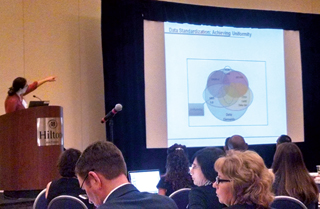
Bundled payments, data assessment and standardization and changing payment models dominated the first full day of the Long Term and Post Acute Care Health IT Summit in Baltimore.
Bundled payments will continue to grow as the government and stakeholders are better able to scale what is working, said Kelly Cronin, director of the Office of Care Transformation, Office of the National Coordinator for Health Information Technology. There is a lot of interest in going beyond Medicare and Medicaid, she noted.
“We want to do more rational planning, and we want to look at trends across the country,” she said. One area of development may be remote monitoring systems, she said, and looking at workflow integrated into payment.
“We need to ramp up to a different way of paying,” she said. “If you look at ACOs, there’s not a lot of factoring in of the private sector. Not everyone knows how to partner with LTC. We really want to make sure it’s not just doctors and hospitals exchanging data, but the whole care continuum.”
There also is a clinical leadership issue around breaking down silos as organizations, she said. Care plan functioning should allow for task tracking, and data elements should be dynamically updated multi-directionally in real time, as well as become aligned.
“The challenge in LTPAC is to think about partnerships,” Cronin said. “We need your involvement to get this right.”
Part of that includes a CMS data element library with assessment data elements and linked HIT standards, which is expected to be available later this year, according to experts discussing the Improving Medicare Post-Acute Care Transformation Act during a morning session.
Having the data element library linked directly to quality measurements is meaningful, noted National Association for the Support of Long Term Care Executive Vice President Cynthia Morton.
“CMS connected the dots for us,” she told McKnight’s. “It’s one thing to have data, it’s another thing to have that standard.”
Presentations also included a case study from Evangelical Homes of Michigan, which created a program called LifeChoices. CEO Denise Rabidoux described the program, now running for three years, as “PACE on steroids.” The customer pays an entrance fee of $40,000 plus a monthly fee of around $400 a month, she said. A navigator is assigned, with a care team working to keep the independent adult at home. In one recent case, a participant had what the care team believed was a transischemic stroke, and the navigator went with the patient to the hospital to make sure she was not admitted or sent to a skilled nursing facility. She was quickly returned home.
“In LifeChoices, the risk is managed,” Rabidoux said. So far, 98% of participants have maintained their independent status, and the program is financially solvent for the not-for-profit organization.
Other presenters discussed progress made with Demonstration Grant for Testing Experience and Functional Assessment Tools in Community-Based Long Term Services and Supports (TEFT), Aging 2.0, and the Care at Hand model.
The summit, held at the Hilton Baltimore, concludes Tuesday.




